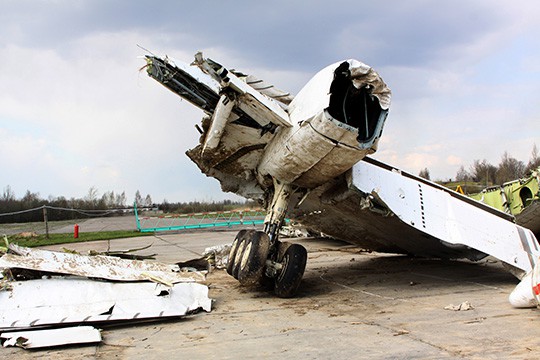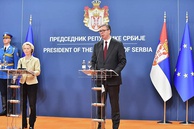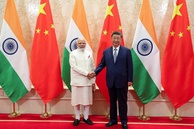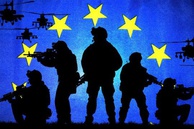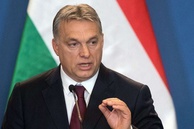As Polish media reports, Foreign Minister Radoslaw Sikorski has acknowledged that the 2010 air crash near Smolensk which claimed the lives of the then President Lech Kaczynski and a number of high-ranking government officials was an “accident”, not an “assassination”. Only 14 years after did Warsaw come to such a conclusion. It took Poland so long to acknowledge the obvious that the story is akin a detective one.
Sikorski reminded journalists that an investigating commission which was set up by the Polish authorities right after the catastrophe conducted an inquiry and published an official report. However, the text of the report was deleted from state-run Internet resources on orders from the country’s former government. Earlier, in January this year, it was reported that Warsaw had officially withdrawn the lawsuit filed against Russia by the previous administration with the European Court for Human Rights in connection with the air crash.
The Tupolev TU-154 plane, operated by the Polish Air Forces, fell down while approaching the Russian Smolensk air base on April 10, 2010. The crash killed President Lech Kaczynski, his wife, and 94 more people, among them a large number of top military officials, government officials, 18 parliamentary deputies, the head of the National Bank.
The government of Poland, which at the time was headed by Civil Platform leader Donald Tusk, set up a commission chaired by Interior Minister Jerzy Miller. The commission came to the conclusion that the crash had been an accident caused by a human error as the pilots had been trying to land the plane in the conditions of poor visibility and thick fog.
In turn, «The Interstate Aviation Committee (IAC) said after an inquiry that the crash had been prompted by the crew’s refusal to land at an emergency airfield in the conditions of thick fog, …lack of pilot training skills»,[i] and pressure on the crew from the high-ranking passengers. In March 2015 the Polish commission put some of the blame for the air crash on Russian air traffic controllers, who, as the Polish party claim, provided the pilots with wrong instruction thereby making them believe that they were on the right course to landing.
But Warsaw did not find it enough. The leader of the major opposition party, the late president's twin brother Jaroslaw Kaczynski declined to accept the results of the inquiry by the Polish Interior Ministry commission. His party, “Law and Justice”, put forward a version under which the Tusk government ordered to falsify data in order to cover Russia’s involvement in the murder of his brother. In accordance with this “theory”, Moscow “had aimed to take revenge on” President Kaczynski for supporting Georgia in August 2008.
Upon coming to power in autumn 2015, «Law and Justice» formed a new government sub-commission for a second inquiry into the Smolensk crash. This time, the commission was headed by Defense Minister Antoni Macierewicz. The new panel proposed several versions, trying to prove that the TUPOLEV-154 had been sent down by an explosion. Unlike the previous commission, which carried out an inquiry on the scene, members of the new sub-commission refused to examine evidence found by Russian investigators on the site of the crash arguing that the site had been subjected to manipulation. In spring 2016, Macierewicz announced that the air crash near Smolensk had been “a terrorist act”.
Over time, in the opinion of the critics and political opponents of the Kaczynski party, the catastrophe near Smolensk had been turned into a media and political campaign that evolved over the cult of the victim. Law and Justice began to manipulate the tragedy to bring together scattered right groups and those representatives of the electorate that poorly adapted to the changes caused by globalization, new technologies and fierce competition on the European labor market. It was yet another attempt to hold Russia responsible for the disillusionment with the reality experienced by the conservative section of the Polish society.
In 2018 году Macierewicz was dismissed from the position of defense minister. Even though his sub-commission continued to work, observers pointed out a gradual change in Jaroslaw Kaczynski’s rhetoric. He was becoming more and more critical of the conclusions of the government commission under Tusk but rarely remembered of his numerous promises to “get to the truth”. The headlines with “Russian responsibility” for the air crash near Smolensk got back on the front pages of the Polish media in April 2022, with Polish officials claiming yet again that “behind the accident of 12 years before was Russia”. A special government sub-commission yet again came up with statements that the catastrophe had become the result of a murder plan devised by Moscow. Polish accusations have been escalating since then.
Significantly, accusations of Russia “involvement” became common in Polish policy well before the escalation of Ukrainian conflict. For the nationalistic right-wing part of the Polish political elite the appeal to “external forces” has been common at all times. Given the widening differences between the top right-wing Law and Justice Party and its allies, this practice has gained ever more momentum in recent years.
The results of parliamentary elections last autumn demonstrated that nationalists are currently enjoying less support in the Polish society than before. The new government, headed yet again by deeper Euro integration proponent Donald Tusk, are likely to waive the most odious elements of the Law and Justice political legacy. In December last year new Interior Minister Marcin Kierwiński announced that “Poland was planning to waive the version” of Russia being to blame for the air crash near Smolensk. The incumbent interior minister described the original report by the Miller commission as “an official document which people like Antoni Macierewicz have been “trying to destroy” in recent years”. The period of time during which the Macierewicz commission worked was described by Kierwiński as the time of “conspiracy and lies”.[ii]
But the change of government did not lead to any changes in Warsaw’s official policy towards Moscow. Regardless of the current Polish-Ukrainian differences and attempting to play a key role in the Ukrainian conflict, Warsaw resorts to “anti-imperialistic” rhetoric, accusing Russia of a desire “to rule and dominate” in Central and Eastern Europe. Fully aware of its limited military and political potential, Poland is trying to search for arguments against Russia in areas that bear a historical and value subtext. Given this, the decision to discontinue the narrative on “Russian conspiracy near Smolensk” comes as an unexpected tribute to common sense and an objective reality.
The opinion of the author may not coincide with the opinion of the Editorial
[i] https://rg.ru/2023/12/15/mvd-polsha-otkazhetsia-ot-versii-o-vine-rossii-v-krushenii-tu-154-pod-smolenskom.html
[ii] https://ria.ru/20231215/polsha-1916053059.html
read more in our Telegram-channel https://t.me/The_International_Affairs

 11:53 14.03.2024 •
11:53 14.03.2024 •
